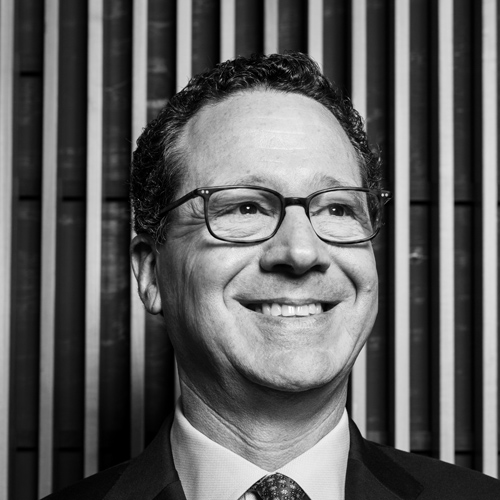Jonathan Greenberg was born in Washington, DC, but as the son of a diplomat, he grew up living all across Europe. As a child, Greenberg considered joining the State Department like his father, but while attending law school at the University of Virginia, he grew enamored with corporate and commercial law. Now, as general counsel and secretary for DURA Automotive Systems, Greenberg combines his diplomatic skills with his legal expertise to manage the global legal, compliance, and IP functions at the leading automotive supplier, which employs more than twelve thousand individuals and has revenues of approximately $1.5 billion.
“A GC has to be a diplomat, trying to get everyone out of their stovepipes, mediating between departments and folks who may rarely engage with each other,” Greenberg says. Indeed, he joined DURA in 2016 as part of an almost entirely new management team charged with improving interaction within the organization. “In the last two years at DURA, we’ve experienced a nearly complete turn of the executive leadership team, and one of the mandates from our CEO, Lynn Tilton, has been for us to start collaborating more,” he says. “And we are—starting at the executive leadership level. We are in effect discovering each other and our respective organizations and working more transparently and collaboratively as a team.”
Beyond his diplomatic upbringing, Greenberg has more than twenty-four years of legal experience. He began his legal career at a major Wall Street law firm and practiced as an associate at the DC offices of Holland & Knight, a leading global law firm with more than 1,500 attorneys, before being elected partner in 2000. He was general counsel and senior corporate counsel at two technology companies and he previously served as general counsel at three publicly traded companies in the defense, aviation, and technology sectors.
At DURA, he is responsible for global legal and compliance functions, including negotiating contracts and other commercial relationships, managing litigation and other risks, ensuring adherence to corporate governance requirements, compliance with global legal and regulatory regimes, and patent and other IP filings, along with related enforcement. As an international supplier, DURA has many foreign subsidiaries, customers, suppliers, and technology partners, and Greenberg understands that a diplomatic touch is often required to sustain and improve these relationships. One of his first moves was to hire a general counsel for Europe, stationed on the continent, which led to improved results, especially in Germany.
“We have a factory in Germany that lost significant amounts of money for years,” Greenberg says. “Last year, the local unions threatened to shut the plant down, and they succeeded in slowing our production to a point that the backlog became alarming to customers. Our new European counsel stepped up and got involved on a daily basis.” The counsel knew the local laws and customs and worked closely with a new DURA operations team in Germany, as well as local HR and finance. “He has fostered significantly improved dialogue and better working relationships over there,” Greenberg says.
That speaks to Greenberg’s overarching passion: bridging gaps and making a difference. He wants to position the legal function as a business partner, not a speed bump or barrier on the road to success. “The measure of success is when people come to you for help because then you know you’ve become a value-add,” he says. The legal function can often be wrongfully assumed to be “the office of no,” so he strives to position it in a more practical, business-oriented light. “There is a perception by some business folks that legal is slow and bureaucratic, which can be a fair criticism,” he says. “They think we are only there to fix the screw-ups and paint the traffic lanes on the highway, but otherwise we are viewed as slowing down the process.”
Greenberg tries to foster a business-friendly approach. “When you run a global operation, you have to respond 24/7, and touching base quickly is key to developing internal support,” he says. “My team understands that. Our value-add is to ask questions and learn about the business imperatives. If the goal is tax savings in Germany, let’s talk about that.” That’s not always the case, as Greenberg says that lawyers sometimes focus too much on the words on paper instead of the reasons behind them. “When someone comes running and says, ‘I need blank, and I need it yesterday,’ don’t just run around with your hair on fire,” he says. “Ask them why. Who is asking for this? What are they trying to do? Dig in. It turns out that many times the path we’re heading down is not optimal or one that hasn’t been coordinated with other departments or simply is not as time-sensitive as initially presented. To get that business perspective, you have to lift your head up, stop staring at the words, and start talking to people about what they’re trying to accomplish.”
The job of the legal department, he says, is to understand and anticipate the concerns of its constituents. “What is exciting and fun, but also challenging, is that as a GC you are literally surrounded by your clients. Everyone at DURA, to one degree or another, is a customer of our law department,” he says. One of Greenberg’s key goals is to work cross-functionally to harmonize operations, finance, engineering, and supply chain: “To bring together all the different perspectives.” Spoken like a true diplomat

